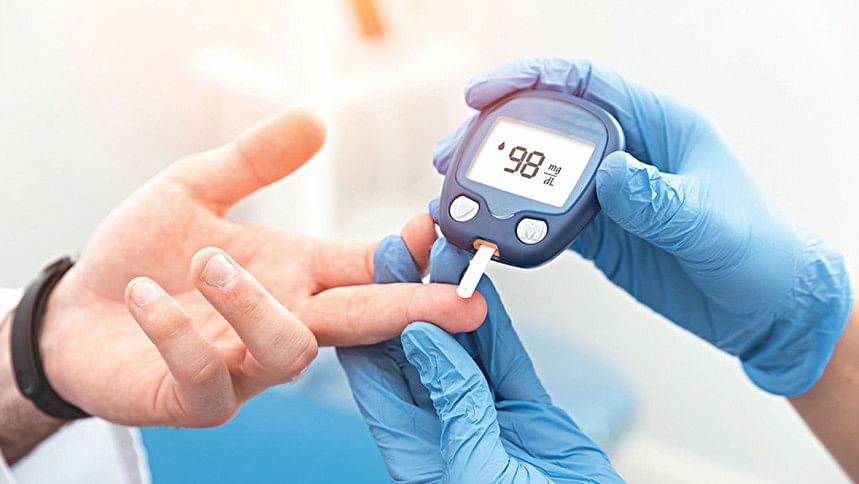World Diabetes Day being observed with call for healthy lifestyle

In observance of World Diabetes Day today, various organisations, including the Bangladesh Diabetes Association, are holding awareness events nationwide.
With the theme "Diabetes: Let Healthy Living Be Our Commitment," this year's focus highlights the importance of adopting lifestyle changes to prevent and manage diabetes.
Bangladesh Diabetes Association reports that between 6 and 14 percent of pregnant women in Bangladesh have diabetes, with around 50 percent of those with gestational diabetes at risk of developing type-2 later in life. Additionally, children born to mothers with gestational diabetes are at higher risk of developing diabetes in the future.
Currently, about 43.5 percent of diabetics in Bangladesh remain undiagnosed, and the disease accounts for roughly 10 percent of all deaths in the country, according to the International Diabetes Federation (IDF).
Experts warn that diabetes, often termed a "silent killer," is a chronic disease that can be prevented or managed with lifestyle adjustments. Maintaining controlled habits significantly reduces the risk of complications.
Recent data from the National Diabetes Treatment Guideline revealed that approximately 13.1 million people in Bangladesh are diabetic, affecting 14.2 percent of those aged 20-80.
The country currently ranks eighth in global diabetes prevalence, and projections suggest that by 2045, this number could reach 22.3 million.
BIRDEM Hospital, one of Bangladesh's leading treatment centres for diabetes, serves over 3,000 patients daily in its outpatient services. Hospital officials caution that unmanaged diabetes can lead to severe complications, including damage to the kidneys, eyes, heart, and feet.
Globally, the International Diabetes Federation (IDF) estimates that 537 million adults are currently living with diabetes, with three in four cases occurring in low- and middle-income countries.
In 2021, diabetes led to 6.7 million deaths, and by 2045, projections indicate that one in eight adults—around 783 million people—will have diabetes, marking a 46 percent increase.
Diabetes is typically classified into two types: type-1, which primarily affects those under 30, and type-2, which is largely driven by factors like urbanisation, low physical activity, obesity, and poor dietary habits.
Over 90 percent of diabetic cases in Bangladesh are type-2, according to the World Health Organization.
National Professor A K Azad Khan, president of the Diabetic Association of Bangladesh, warned that rising diabetes rates are fueled by the consumption of fast food and fatty foods, lack of exercise, and weight gain.
He stressed that if left uncontrolled, diabetes increases the risk of serious health complications, including heart attacks, strokes, kidney failure, blindness, and potential limb amputations.

 For all latest news, follow The Daily Star's Google News channel.
For all latest news, follow The Daily Star's Google News channel. 



Comments